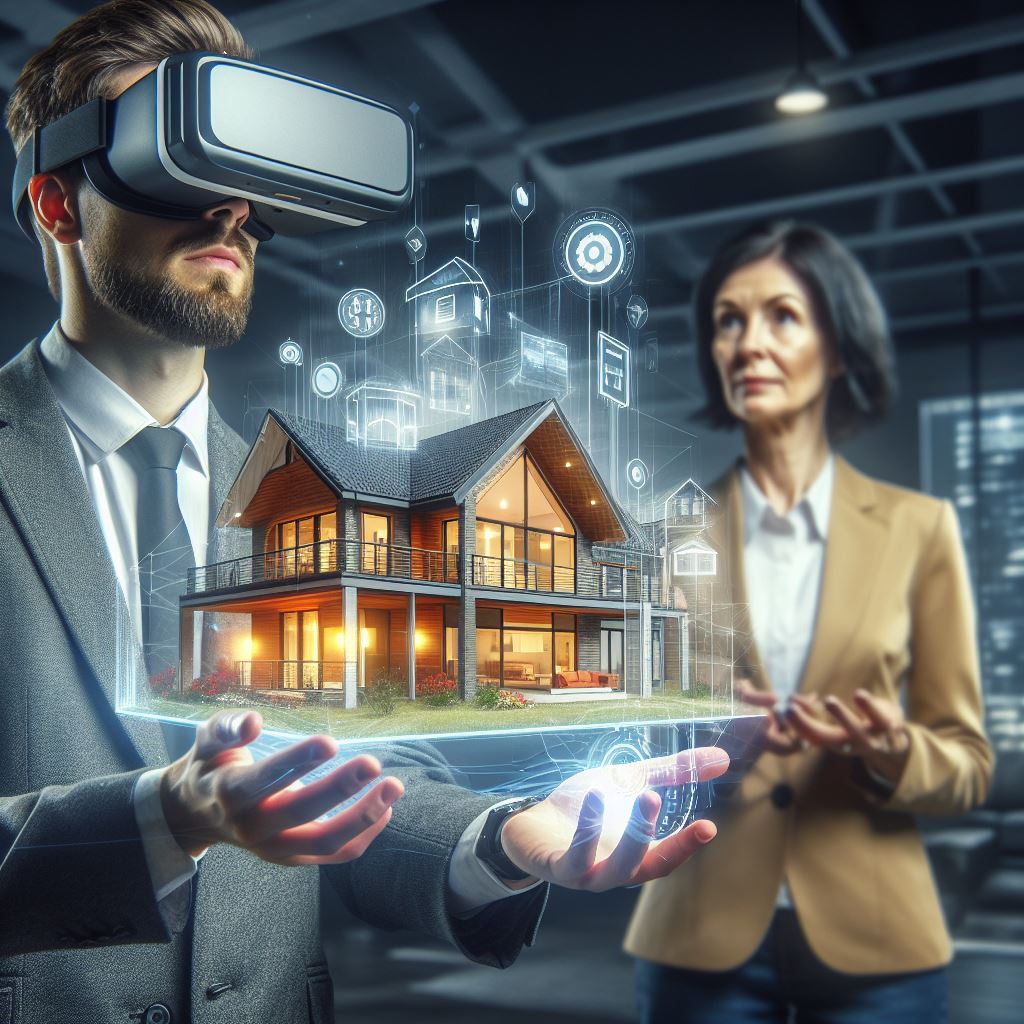Virtual Reality: A Boon for Realtors
Last Updated on February 5, 2024
Introduction
Virtual reality (VR) is a technology that creates a simulated, immersive environment where users can interact with computer-generated content.
It has gained significant popularity across various industries, and the real estate sector is no exception.
The real estate industry plays a crucial role in the economy, as it involves the buying, selling, and renting of properties.
It is a highly competitive industry that requires constant innovation and adaptation to keep up with ever-changing market trends.
Virtual reality has emerged as a game-changer for realtors, revolutionizing the way properties are marketed and showcased to potential buyers.
With VR, real estate agents can now offer virtual property tours that provide a realistic experience to clients.
Gone are the days when buyers had to physically visit multiple properties to make a decision.
Now, with the help of VR, they can explore properties from the comfort of their homes.
This saves time and effort for both buyers and realtors.
Furthermore, virtual reality enables realtors to stage homes without actually investing in furniture and decor.
Virtual staging allows them to create visually appealing interiors that attract potential buyers and help them visualize the space with various design options.
Moreover, VR technology helps bridge the gap between the buyer’s imagination and the property’s potential.
With virtual renovations and customizations, buyers can make informed decisions about a property’s potential, leading to increased sales and customer satisfaction.
In fact, virtual reality is proving to be a boon for realtors in the real estate industry.
It allows them to provide immersive property experiences, saving time and effort for buyers while increasing sales opportunities.
As technology continues to advance, virtual reality will undoubtedly play a pivotal role in shaping the future of the real estate sector.
Benefits of Virtual Reality for Realtors
In today’s digital age, virtual reality has emerged as a revolutionary technology that is transforming various industries.
One such industry that is reaping the benefits of virtual reality is real estate.
Realtors are leveraging this technology to enhance property visualization, conduct remote property tours, and save both time and costs.
Enhanced Property Visualization
- Virtual reality allows realtors to create immersive and interactive property visualizations.
- Buyers can explore virtual tours of properties from the comfort of their homes.
- With virtual reality, potential buyers can have an accurate sense of the property’s layout and design.
- Realtors can showcase both finished homes and properties under construction, providing a comprehensive view.
- Virtual reality enables prospective buyers to customize the property’s features, such as furniture or decor, virtually.
Remote Property Tours
- Virtual reality eliminates the need for physical property visits, making it convenient for both realtors and buyers.
- Potential buyers can virtually tour multiple properties without the time and cost constraints of in-person visits.
- Realtors can cater to global buyers who are unable to travel to the location of the property.
- Virtual reality offers a realistic experience, allowing buyers to make informed decisions without physically being present.
- Buyers can view properties at their own pace and revisit specific areas, ensuring a thorough evaluation.
Time and Cost Savings
- Virtual reality technology significantly reduces the time required for property transactions.
- Realtors can showcase a larger number of properties virtually, reaching a wider audience.
- Buyers can save on travel costs, accommodation expenses, and other associated costs of physical property visits.
- Virtual reality offers efficiency in the negotiation and decision-making process, shortening property sale cycles.
- Realtors can allocate their resources more effectively by focusing on serious buyers who have already explored properties virtually.
Virtual reality has undoubtedly revolutionized the way realtors operate in the industry.
By embracing this technology, real estate professionals are able to provide an unparalleled experience to both buyers and sellers.
The enhanced property visualization, remote property tours, and time and cost savings are just a few of the many benefits that virtual reality brings to realtors.
In short, virtual reality has become a boon for realtors, enabling them to navigate the challenges of the real estate market seamlessly.
As technology continues to advance, we can expect virtual reality to further transform the industry, providing innovative and immersive solutions for all stakeholders involved.
Read: The Impact of VR on Property Values
Case studies of real estate agencies using virtual reality
Virtual reality (VR) technology has revolutionized various industries, and the real estate sector is no exception.
In recent years, many real estate agencies have started utilizing VR to enhance their sales strategies, improve client satisfaction, and expand their reach to international clientele.
Let’s take a closer look at some case studies of real estate agencies that have successfully implemented VR:
Zillow: Increased Sales and Client Satisfaction
Zillow, one of the largest online real estate marketplaces, has embraced VR technology to provide immersive experiences to potential buyers. By leveraging VR, Zillow allows clients to virtually tour properties from the comfort of their homes.
This has resulted in increased sales as buyers can make more informed decisions before physically visiting a property.
Additionally, clients have reported higher satisfaction levels as they can explore properties at their own pace without any time constraints.
Sotheby’s International Realty: Expanded Reach and International Clientele
Sotheby’s International Realty, a prestigious real estate agency, recognized the potential of VR in reaching a global audience.
By implementing VR technologies, they have been able to offer virtual property tours to potential buyers around the world.
VR allows international clients to have a realistic and immersive experience of the properties they are interested in, eliminating the need for them to travel long distances for viewing.
This has significantly expanded Sotheby’s clientele and opened up new markets for the agency.
EXP Realty: Streamlined Communication with Clients
EXP Realty, a forward-thinking real estate agency, has integrated VR into their communication channels to enhance collaboration with clients.
Through VR, agents at EXP Realty can conduct virtual meetings with clients and showcase properties in a more interactive manner.
This streamlined communication process saves time for both parties and creates a more engaging experience.
Clients can even provide real-time feedback on properties, allowing agents to tailor their offerings to meet their specific needs.
These case studies highlight how VR has transformed the real estate industry by offering unique benefits to realtors and clients alike.
However, it’s important to note that while VR has its advantages, it is not a complete replacement for physical property visits.
Virtual tours can provide a preliminary understanding of a property, but experiencing it in person is crucial for making final decisions.
In essence, VR has proven to be a boon for realtors by increasing sales, improving client satisfaction, expanding reach, and streamlining communication.
As technology continues to advance, we can expect VR to play an even more significant role in the real estate industry.
Realtors who embrace VR will have a competitive edge and be able to provide exceptional services to their clients in this increasingly digital world.
Read: AR Tools for Efficient House Hunting

Challenges and limitations of virtual reality in real estate
Virtual reality technology has emerged as a game-changer in various industries, including real estate.
However, like any innovative solution, it comes with its set of challenges and limitations.
Here are some key factors to consider:
Cost of implementing virtual reality technology
One of the primary challenges faced by realtors is the cost associated with implementing virtual reality technology.
Developing a virtual reality experience requires investment in high-quality hardware, software, and expertise.
Creating immersive virtual tours and 3D models can be a costly endeavor for real estate agencies, especially smaller ones.
The expenses involved in purchasing VR headsets and cameras can put a strain on their budgets, making it less feasible for widespread adoption.
Limited access and adoption in some areas
Although virtual reality is gaining popularity, its adoption is still limited in some areas.
Availability of high-speed internet, hardware, and trained personnel are crucial for a seamless virtual reality experience.
In rural or remote areas, where internet connectivity may be limited, accessing virtual tours or 360-degree videos can be a challenge.
Moreover, the lack of awareness and understanding of virtual reality among potential clients may hinder its adoption in certain regions.
Potential loss of personal touch in client interactions
Real estate transactions often involve a personal touch and building trust between clients and realtors.
The use of virtual reality technology may potentially decrease the face-to-face interactions between realtors and clients, leading to a loss of personal touch.
The ability to read clients’ facial expressions, answer their queries on the spot, and provide personalized advice are some of the aspects that cannot be fully replicated through a virtual tour.
Some clients may also prefer the traditional way of visiting properties physically, as it allows them to get a real feel for the space.
Despite these challenges, virtual reality technology in real estate offers several advantages that outweigh the limitations:
Enhancing property visualization
Virtual reality allows potential buyers to virtually walk through properties from the comfort of their homes.
They can explore every corner, assess the layout, and visualize the space as if they were physically present.
By providing an immersive experience, virtual reality technology improves property visualization, helping clients make informed decisions about whether a property meets their requirements.
Saving time and resources
Traditionally, realtors have spent a significant amount of time showing properties physically to potential buyers.
Virtual reality technology eliminates the need for multiple in-person visits.
Potential buyers can narrow down their options by virtually touring different properties, saving time for both realtors and clients.
This technology also reduces the need for travel, especially for international buyers looking to invest in properties remotely.
Expanding the reach of real estate listings
Virtual reality technology enables realtors to showcase their listings to a global audience.
Potential buyers from anywhere in the world can view properties without being physically present.
By expanding the reach of listings, virtual reality technology increases the chances of attracting international buyers, resulting in potential sales that may not have been possible otherwise.
In a nutshell, while there are challenges and limitations associated with virtual reality in real estate, the benefits it offers cannot be overlooked.
As technology continues to advance and become more accessible, it is likely to become an integral part of the real estate industry, revolutionizing the way properties are bought and sold.
Read: VR Home Customization: A Reality
Future Prospects of Virtual Reality in Real Estate Industry
Virtual reality (VR) has emerged as a groundbreaking technology in various industries, and the real estate sector is no exception.
With its ability to create immersive experiences, VR has been a boon for realtors, revolutionizing the way properties are showcased and increasing customer engagement.
The future prospects of VR in the real estate industry are highly promising, and here are some key factors contributing to its growth:
Growing Demand for Immersive Experiences
- Buyers today seek more than just static images and descriptions of properties.
- VR offers a fully immersive experience, allowing potential buyers to virtually walk through properties.
- With VR, realtors can provide a realistic sense of space, dimensions, and room layouts.
- Immersive experiences enable buyers to visualize themselves living in the property, increasing their emotional connection.
- This growing demand for immersive experiences creates a significant market for VR in the real estate industry.
Integration with Other Technologies
- In addition to VR, the integration of other technologies like artificial intelligence (AI) and augmented reality (AR) further enhances the real estate experience.
- AI algorithms can analyze customer preferences and offer personalized property recommendations.
- AR overlays virtual elements onto the real-world environment, allowing users to see potential renovations or furniture placements.
- By leveraging these technologies together, realtors can provide a comprehensive and interactive buying experience.
- Integration with AI and AR opens up new possibilities for virtual property tours and customized property staging.
Potential for Virtual Reality in Property Management and Staging
- VR not only benefits property buyers but also offers significant advantages in property management and staging.
- Property managers can use VR to remotely assess and maintain properties, reducing the need for physical visits.
- Virtual property tours can streamline the rental or sales process, saving time for both landlords and tenants.
- For property staging, VR allows realtors to showcase different design options virtually, eliminating the need for physical staging.
- Virtual staging is cost-effective, scalable, and offers endless possibilities for customization.
- Realtors can virtually furnish properties according to different buyer preferences, increasing their chances of closing deals.
Therefore, the future prospects of virtual reality in the real estate industry are exceptionally bright.
The demand for immersive experiences, integration with technologies like AI and AR, and its potential in property management and staging make VR an invaluable tool for realtors.
As the technology continues to advance, realtors who embrace VR stand to gain a competitive edge by providing unique and engaging experiences to potential buyers.
Moreover, VR has the potential to transform the entire real estate buying process, making it more efficient and convenient for both buyers and sellers.
As virtual reality becomes more accessible and widely adopted, it is expected to reshape the real estate industry, making property transactions more immersive, personalized, and efficient.
Read: Virtual Open Houses: A New Era
Conclusion
Virtual reality offers numerous benefits for realtors in the real estate industry.
It allows potential buyers to have immersive virtual tours, saving time and effort for both parties involved.
Additionally, virtual reality helps overcome the challenges of distance and allows for a global audience.
However, there are some challenges that need to be addressed, such as the cost and technical requirements associated with virtual reality.
The industry needs to find solutions to make virtual reality more accessible and affordable for realtors.
Looking into the future, virtual reality holds great prospects for the real estate industry.
With advancements in technology, it is expected that virtual reality will become even more realistic and interactive, providing a seamless experience for potential buyers.
It is of utmost importance for realtors to embrace virtual reality as a tool for their business.
By adopting virtual reality, realtors can stay ahead of the competition and attract more clients.
The ability to offer virtual tours gives realtors a unique selling point and enhances the overall customer experience.
In summary, virtual reality has proven to be a boon for realtors, offering countless benefits, addressing challenges, and providing a promising future.
It is crucial for the real estate industry to fully embrace virtual reality and harness its potential to revolutionize the way properties are bought and sold.


